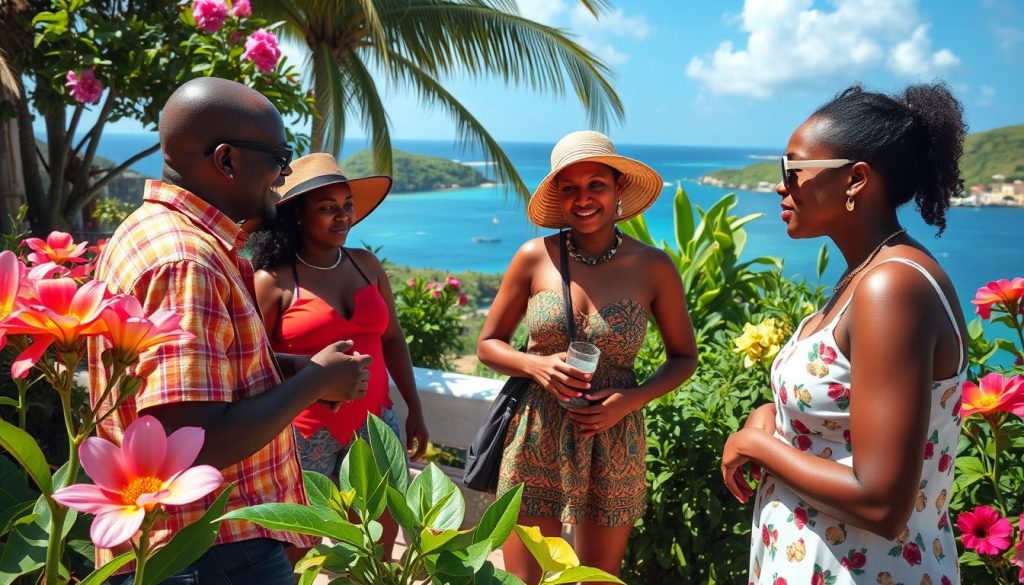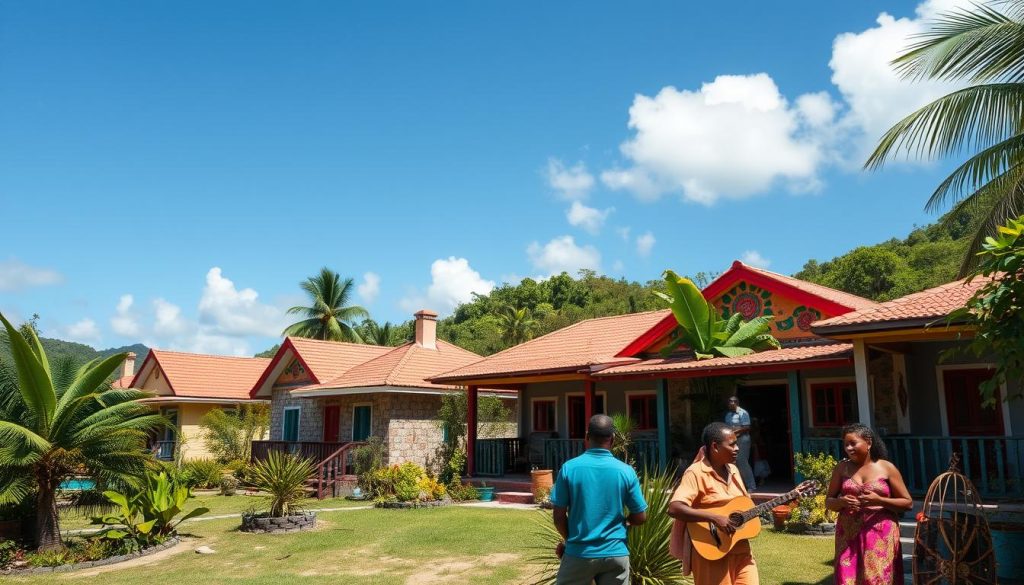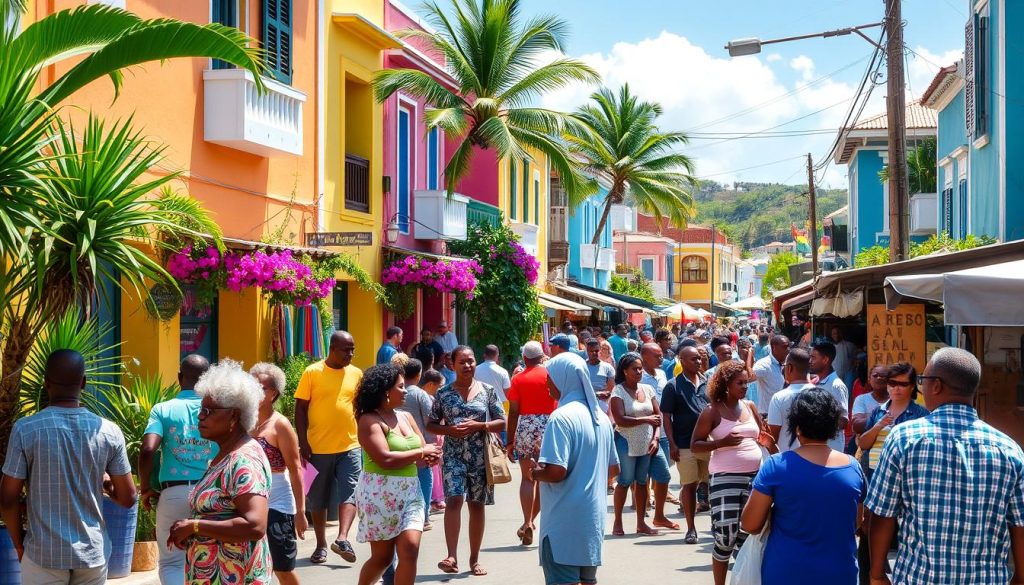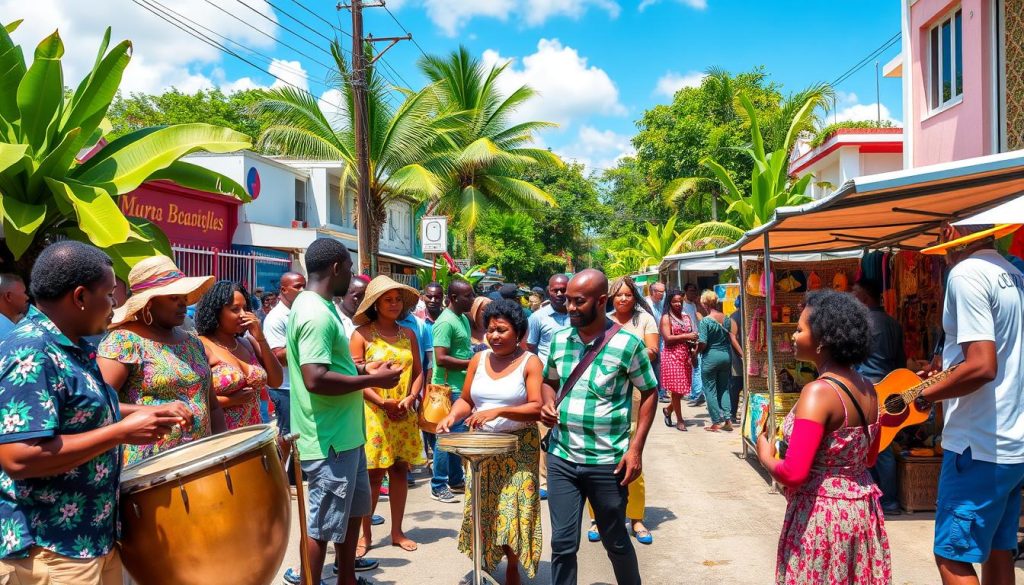Ever thought about how a small Caribbean island’s language shows its cultural strength and change over time? In Grenada, languages are more than words. They tell stories of survival, adapting, and finding one’s identity.
Grenada’s language scene is a colorful mix of cultures. English is the official tongue, but Grenadian Creole English is the real heartbeat of the island. It’s spoken by about 89,000 locals. This special Caribbean language mixes African, French, and English, showing the island’s deep history.
The island’s language scene is more than just official languages. In rural areas, Grenadian Creole French, or ‘patois’, still shares stories. It keeps alive a link to the island’s complex colonial past.
Key Takeaways
- English is the official language of Grenada
- Grenadian Creole English is the most widely spoken language
- Around 81% of the population uses Creole English as their primary communication method
- The language reflects a blend of African, French, and English influences
- Linguistic diversity mirrors Grenada’s complex cultural heritage
Overview of Grenada’s Linguistic Landscape
Grenada’s languages show a rich mix of cultures shaped by history. The island’s languages tell of colonial times, cultural strength, and speaking many languages.
Historical Development of Languages
Grenada’s language story starts with the indigenous people. Then, European powers like France and Britain changed the island’s language world. The old languages mixed with African, European, and local sounds to create creoles.
- Pre-colonial indigenous communication
- French colonial language influences
- British linguistic transformations
- African language contributions
Current Language Distribution
Now, Grenada is a place of many languages. English is the official tongue, but Grenadian Creole French and local talks are key in everyday chats.
| Language | Percentage of Speakers | Primary Usage |
|---|---|---|
| English | 90% | Official communication |
| Grenadian Creole French | 40% | Informal communication |
| Local Dialects | 25% | Community interactions |
Geographic Language Patterns
In Grenada, language changes with the place. St. George’s, the city, speaks more standard English. But, in the countryside, creole talks are stronger.
“Language is the road map of a culture. It tells you where its people come from and where they are going.” – Rita Mae Brown
Exploring Grenada’s languages shows a vibrant culture. Here, speaking many languages is not just common; it’s a way of life.
English as the Official Language of Grenada

Exploring Grenada’s language scene, English is the key to official talks. It’s the main language used in government, schools, and formal talks across the island.
The English language policy in Grenada shows the country’s complex past. English is used everywhere, helping the nation’s diverse people of about 112,207 to communicate.
“Language is the roadmap of a culture. It tells you where its people come from and where they are going.” – Rita Mae Brown
Important roles of English in Grenadian life include:
- Primary medium of instruction in schools
- Language of government administration
- Legal and judicial proceedings
- Media and public communications
Even though English is official, Grenada is rich in languages. Grenadian Creole English lives alongside standard English, showing the nation’s lively culture.
Knowing about Grenada’s language scene is key. English helps with talking to the world, especially in tourism, education, and business.
Grenadian Creole English: The People’s Voice
Explore the lively world of Grenadian Creole English. It’s a treasure that shows the heart and soul of Grenadian culture. This unique language is more than talking—it’s a living piece of the island’s history.
Grenadian Creole English is spoken by almost 89,000 people. It’s a key part of the Caribbean’s language mix. Its history comes from English and African languages, shaped by the island’s past.
Linguistic Structure and Vocabulary
The language has a unique structure that’s different from standard English. Its words show Grenada’s mix of cultures. You’ll find:
- African influences
- British colonial words
- Local expressions
- Special sounds
Social Context and Usage
Grenadian Creole is more than a way to talk. It’s a sign of culture. People use it every day, keeping their identity alive.
“Our language is our history, spoken through every word and phrase.” – Anonymous Grenadian Elder
Regional Variations
Grenadian Creole changes from place to place. Each area has its own special way of speaking. This shows the unique stories and histories of local communities.
| Region | Linguistic Characteristics |
|---|---|
| Coastal Areas | More maritime vocabulary |
| Rural Inland | Agricultural terminology prevalent |
| Urban Centers | More standardized pronunciation |
Learning Grenadian Creole English lets you see the island’s heart. It shows how language changes and grows with culture.
Grenadian Creole French (Patois): A Cultural Heritage

Grenadian Creole French, or patois, is a key part of Grenada’s cultural mix. It came from the mix of French settlers and enslaved Africans. This language shows the complex history of Grenada.
The French patois is a strong symbol of Grenada’s culture. It keeps alive traditions passed down through generations. Unlike Grenadian Creole English, it’s mainly spoken in rural areas by older folks.
“Language is the roadmap of a culture. It tells you where its people come from and where they are going.” – Rita Mae Brown
Some key traits of Grenadian Creole French are:
- Antillean Creole roots
- Strong African linguistic influences
- Limited but passionate speaker community
- Primarily oral transmission
Even though fewer people speak it, efforts are being made to save this language. Community leaders and linguists see it as a vital link to Grenada’s past.
You can still hear French patois in local talks, stories, and gatherings. Every word spoken in patois connects us to Grenada’s rich cultural history.
Impact of Colonial History on Language Development
Grenada’s language scene is a colorful mix from centuries of colonial ties. The island’s language policy grew from a complex history. This history shaped the Caribbean’s languages and diversity.
French Colonial Roots
In 1649, French colonizers came to Grenada, changing its language. The early days saw the birth of Grenadian Creole French. This language came from the mix of European settlers and local people.
- French control lasted from 1649 to 1763
- Established three sugar estates and 52 indigo plantations
- Introduced new vocabulary and communication patterns
British Linguistic Transformation
The British took over in 1762, bringing another big change. English slowly became the main language. It changed education, government, and how people talked to each other.
“Language is the road map of a culture. It tells you where its people come from and where they are going.” – Rita Mae Brown
Post-Independence Language Policies
After becoming independent in 1974, Grenada made new language rules. English stayed the official language, but Grenadian Creole was also kept alive. It’s a key part of the culture.
- English became the language of government and education
- Preservation of Creole dialects
- Recognition of linguistic diversity
Knowing about this language change helps us see Grenada’s rich culture. It’s a colorful mix of languages and traditions.
Multilingualism in Grenadian Society

Grenada is known for its rich cultural heritage, shown through its many languages. The island’s mix of languages adds color to everyday life, social talks, and cultural shows.
In Grenada, speaking more than one language is common. About 90% of people can speak at least one extra language. This skill is not just a cultural thing but also useful in today’s world.
“Language is the roadmap of a culture. It tells you where its people come from and where they are going.” – Rita Mae Brown
The languages found in Grenada are:
- English (official language)
- Grenadian Creole English (spoken by 65% of population)
- Grenadian Creole French (Patois)
- Some Hindi/Bhojpuri terms among Indo-Grenadian descendants
Switching between languages is common in Grenada. About 25% of people easily move between English and Creole in casual talks. This shows how flexible communication is in Grenadian society.
Being multilingual has real economic benefits. Studies show that multilingual people in Grenada can make 15-20% more than those who speak only one language. This is especially true in jobs like tourism and international trade.
The schools in Grenada also support this language richness. About 20% of students are in bilingual programs. This helps keep the island’s language diversity alive and celebrated.
Language Education and Literacy in Grenada
Grenada values its rich language heritage and supports multilingualism. It boasts a high literacy rate of 95%. The country’s education system focuses on English while honoring local languages.
In Grenada, English is the main language taught in schools. This approach supports both learning and cultural preservation.
School System Language Policies
Grenadian schools have language policies to help students. Key points include:
- English as the main teaching language
- Use of Grenadian Creole English in class
- Curriculum that promotes speaking multiple languages
- 10 years of school that focus on language skills
Adult Language Education Programs
Grenada also offers adult language education. These programs aim to:
- Improve English skills
- Keep creole language alive
- Enhance professional communication
- Offer language learning in the community
“Language is the roadmap of a culture. It tells you where its people come from and where they are going.” – Rita Mae Brown
With half of its population under 30, Grenada keeps investing in language education. It’s a key tool for social and economic growth. This ensures future generations stay connected to their language heritage while being ready for the world.
Cultural Expression Through Language
Grenadian Creole is a vibrant canvas for cultural storytelling. It brings the island’s rich heritage to life. Your journey through Grenada’s linguistic landscape shows how Caribbean languages capture the soul of its people.

In Grenada, language is an art form. Linguistic diversity turns everyday talk into a powerful cultural expression. The rhythmic sounds of Grenadian Creole echo through various mediums:
- Musical performances that blend local dialects
- Storytelling traditions passed through generations
- Local poetry and theatrical productions
“Sla’w sé sla’w!” – A powerful Grenadian Creole phrase meaning “Yours is yours!” perfectly captures the essence of cultural ownership through language.
Artists and performers use Grenadian Creole as a dynamic tool for preserving cultural identity. With over 30 distinct dialects, the language represents a complex tapestry of community experiences.
| Cultural Medium | Language Usage |
|---|---|
| Music | Creole lyrics and traditional rhythms |
| Literature | Local storytelling and poetry |
| Theater | Performances reflecting local dialects |
Despite only 5% speaking Grenadian Creole as a first language, community initiatives work tirelessly to keep this linguistic heritage alive. Your appreciation of these cultural expressions helps support the continued vitality of this unique Caribbean language.
Modern Language Challenges and Preservation Efforts
Grenada’s languages face big challenges in today’s digital world. The island must balance preserving its languages with global communication. Understanding these efforts helps us see the importance of keeping cultural heritage alive while using modern ways to communicate.
Language Conservation Initiatives
Local linguists are working hard to save Grenadian Creole languages. They are doing many things to help:
- Creating detailed language archives
- Starting language learning programs in communities
- Recording stories from older community members
- Creating school materials in local languages
Digital Language Resources
Technology is key in keeping languages alive. New digital tools are helping a lot:
| Digital Resource | Purpose | Target Audience |
|---|---|---|
| Online Creole Dictionary | Documenting vocabulary and usage | Researchers and language learners |
| Mobile Language Learning App | Interactive language instruction | Youth and diaspora communities |
| Virtual Language Archive | Preserving linguistic recordings | Cultural historians |
“Language is the roadmap of a culture. It tells you where its people come from and where they are going.” – Rita Mae Brown
These efforts show Grenada’s dedication to its languages. You can help by joining local language preservation efforts and sharing the value of speaking many languages.
Conclusion
Exploring Grenadian languages has shown you a unique world. It reflects the island’s rich history and culture. Grenada’s many languages show the nation’s strength and ability to adapt.
Traveling through Grenada’s languages, you see how English and Creole have grown. These languages are key to Grenada’s identity. Despite being small, Grenada has a vibrant language scene. It connects its past to today’s culture.
The tale of Grenada’s languages is about keeping traditions alive and being proud. From official English to lively Creole, these languages show Grenada’s spirit. As Grenada grows its economy and connects with the world, its languages are a big part of its culture.
Grenada is fascinating for anyone interested in languages or the Caribbean. It shows how languages keep heritage alive while welcoming new ideas. The language scene in Grenada is more than words. It’s about who they are, how they’ve overcome challenges, and their ongoing story.
The above is subject to change.
Check back often to TRAVEL.COM for the latest travel tips and deals.
Here are some Tours & Sightseeing suggestions that might pique your interests!
